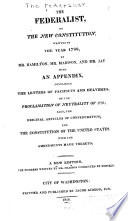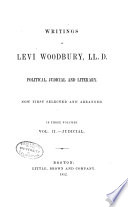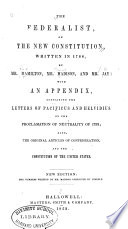 | John Dickinson - Pennsylvania - 1801 - 650 pages
...times of the year, and pursuant to a form and manner pescribed by law. There is no liberty, if the power of judging be not separated from the legislative and executive powers." " MILITARY men belong to a profession, which may be useful, but is often dangerous." " The enjoyment... | |
 | Alexander Hamilton, James Madison, John Jay - Constitutional history - 1817 - 570 pages
...distinct from both the legislature and executive. — For I agree, that" there "is no liberty, if the power of judging be not separated from the " legislative and executive powers. "t It proves, in the last place that as liberty can have nothing to fear from thejudiciary alone, but... | |
 | James Madison, John Jay - Constitutional law - 1818 - 882 pages
...distinct from both the legislature and executive. For 1 agree, that " there is no liberty, u if the power of judging be not separated from the " legislative and executive powers."! ^ proves, in the last place, that as liberty can have nothing to fear from the judiciary alone, but... | |
 | Joseph Story - Constitutional history - 1833 - 800 pages
...distinct from both the legislature and executive. — For I agree, that ' there is no liberty, if the power of judging be not separated from the legislative and executive powers.' It proves, in the last place, that as liberty can have nothing to fear from the judiciary alone, but... | |
 | Tracts - 1836 - 506 pages
...enact tyrannical laws, or execute them in a tyrannical manner. "Again, there is no liberty, if the power of judging be not separated from the legislative and executive powers. Were it joined with the legislative, there the life and liberty of the subject would be exposed to... | |
 | Alexander Hamilton, James Madison, John Jay - Constitutional history - 1837 - 516 pages
...legislative and executive powers are united in the "same person, or body of magistrates;" or, " if the power of "judging, be not separated from the legislative and executive " powers," he did not mean that these departments ought to have no partial agency in, or no control over the acts... | |
 | Robert Christie - Canada - 1848 - 388 pages
...times of the year, and pursuant to a form and manner prescribed by la\v. Thereis no liberty, if the power of judging be not separated from the legislative and executive powers." " Military men belong to a profession which may be useful, but is often dangerous." — The enjoyment... | |
 | Levi Woodbury - Law - 1852 - 448 pages
...main preservative of the public liberty" (1 Bl. Com. 269) ; that, indeed, "there is no liberty, if the power of judging be not separated from the legislative and executive powers." (Montesquieu, B. 11. Ch. 6.) In other words, that "the union of these two powers is tyranny" (7 Johnson... | |
 | Levi Woodbury - Electronic books - 1852 - 444 pages
...main preservative of the public liberty" (1 Bl. Com. 269); that, indeed, "there is no liberty, if the power of judging be not separated from the legislative and executive powers." (Montesquieu, B. 11. Ch. 6.) In other words, that "the union of these two powers is tyranny" (7 Johnson... | |
 | Alexander Hamilton, James Madison, John Jay - Constitutional law - 1852 - 528 pages
...legislative and executive powers are united in the same per"son, or body of magistrates;" or, "if the power of judging, be " not separated from the legislative and executive powers," he did not mean that these departments ought to have no partial agency in, or no control over the acts... | |
| |